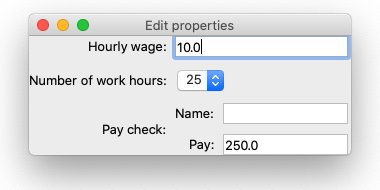Testing with nested objects¶
Suppose we have a GUI application like this:
from traits.api import Enum, HasStrictTraits, Instance, Float, observe, Str
from traitsui.api import Item, InstanceEditor, View
class PayCheck(HasStrictTraits):
name = Str()
pay = Float()
class App(HasStrictTraits):
min_hourly_wage = Float(10.0)
n_hours = Enum([25, 40, 45])
pay_check = Instance(PayCheck)
def _pay_check_default(self):
return PayCheck(pay=self.min_hourly_wage*self.n_hours)
@observe("min_hourly_wage")
@observe("n_hours")
def _pay_updated(self, event):
self.pay_check.pay = self.min_hourly_wage * self.n_hours
view = View(
Item("min_hourly_wage", label="Hourly wage"),
Item("n_hours", label="Number of work hours"),
Item("pay_check", editor=InstanceEditor(), style="custom"),
)
app = App()
app.configure_traits()

When the user selects a different number of work hours in the combo box, the pay is updated accordingly. This behavior is simple enough to be tested without GUI, but we will to write a GUI test for demonstration purposes.
The test will need to:
Find the combo box for the number of work hours field
Locate a different item in the combo box
Click that item to modify the number of work hours
Find the nested ‘pay’ field inside ‘PayCheck’
Check the pay is updated to the expected value
Step 1: Find the combo box for the number of work hours field¶
First of all, find the combo box using the name defined in Item:
from traitsui.testing.api import UITester
app = App()
tester = UITester()
with tester.create_ui(app) as ui:
n_hours_combobox = tester.find_by_name(ui, "n_hours")
Step 2: Locate a different item in the combo box¶
Let’s take a look at the functionality supported with this
n_hours_combobox.
n_hours_combobox.help()
prints something like this (abbreviated for the purpose of this section):
Interactions
------------
<class 'traitsui.testing.tester.command.KeyClick'>
An object representing the user clicking a key on the keyboard.
...
<class 'traitsui.testing.tester.command.KeySequence'>
An object representing the user typing a sequence of keys.
...
<class 'traitsui.testing.tester.query.DisplayedText'>
An object representing an interaction to obtain the displayed (echoed)
plain text.
...
<class 'traitsui.testing.tester.query.SelectedText'>
An object representing an interaction to obtain the displayed (echoed)
plain text which is currently selected.
E.g. For a Enum List, with one entry currently selected, the displayed
selected text would be the label of that entry.
...
Locations
---------
<class 'traitsui.testing.tester.locator.Index'>
A locator for locating a target that is uniquely specified by a single
0-based index.
The Index object allows us to locate an indexed item on the combo box.
Objects listed in the “Locations” section can be used with locate().
So we add this line:
second_item = n_hours_combobox.locate(Index(1))
Now our test looks like this:
from traitsui.testing.api import Index, UITester
app = App()
tester = UITester(delay=500)
with tester.create_ui(app) as ui:
n_hours_combobox = tester.find_by_name(ui, "n_hours")
second_item = n_hours_combobox.locate(Index(1))
Step 3: Modify the number of work hours¶
The returned value of locate() is another instance of UIWrapper.
We can find what are supported on second_item using the help()
method again.
second_item.help()
prints something like this (abbreviated, again):
Interactions
------------
<class 'traitsui.testing.tester.command.MouseClick'>
An object representing the user clicking a mouse button.
Currently the left mouse button is assumed.
...
Locations
---------
No locations are supported.
This help message indicates that we can click this second item. In our application context, this will select the second item in the combo box:
second_item.perform(MouseClick())
Now this is how the test looks like so far:
from traitsui.testing.api import Index, MouseClick, UITester
app = App()
tester = UITester()
with tester.create_ui(app) as ui:
n_hours_combobox = tester.find_by_name(ui, "n_hours")
second_item = n_hours_combobox.locate(Index(1))
second_item.perform(MouseClick())
Step 4: Find the nested ‘pay’ field inside ‘PayCheck’¶
This step is trickier. The pay field is nested inside the pay_check
item, how do we get to it?
Let’s get the pay_check object via the tester and see what we have:
pay_check_pane = tester.find_by_name(ui, "pay_check")
pay_check_pane.help()
The last line prints something like this (abbreviated, again):
Interactions
------------
No interactions are supported.
Locations
---------
<class 'traitsui.testing.tester.locator.TargetById'>
A locator for locating the next UI target using an id.
...
<class 'traitsui.testing.tester.locator.TargetByName'>
A locator for locating the next UI target using a name.
...
We can see that TargetById and TargetByName are available for
locating the next GUI element. We can locate the text box for
pay_check.pay using TargetByName:
pay_field = pay_check_pane.locate(TargetByName("pay"))
In fact, find_by_id() and find_by_name() are simply
aliases for TargetById and TargetByName respectively, so you
can also write:
pay_field = pay_check_pane.find_by_name("pay")
Now this is how the test looks like so far:
from traitsui.testing.api import Index, MouseClick, UITester
app = App()
tester = UITester()
with tester.create_ui(app) as ui:
n_hours_combobox = tester.find_by_name(ui, "n_hours")
n_hours_combobox.locate(Index(1)).perform(MouseClick())
pay_field = tester.find_by_name(ui, "pay_check").find_by_name("pay")
Step 5: Check the pay is updated to the expected value¶
pay_field wraps a text box. We have seen in
First simple test how to obtain the displayed text:
from traitsui.testing.api import DisplayedText
displayed_pay = pay_field.inspect(DisplayedText())
assert displayed_pay == "400.0"
Our final test¶
from traitsui.testing.api import Index, DisplayedText, MouseClick, UITester
app = App()
tester = UITester()
with tester.create_ui(app) as ui:
n_hours_combobox = tester.find_by_name(ui, "n_hours")
n_hours_combobox.locate(Index(1)).perform(MouseClick())
pay_field = tester.find_by_name(ui, "pay_check").find_by_name("pay")
displayed_pay = pay_field.inspect(DisplayedText())
assert displayed_pay == "400.0"
What did we learn?¶
From the output of
help(), objects listed in the “Locations” can be used withlocate()for locating nested GUI components.find_by_name()andfind_by_id()are aliases making use of thelocate()method.locate()returns an instance ofUIWrapperon whichlocate()can be called again;perform()andinspect()can be used on the nested object located.
